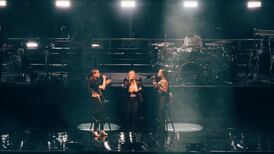DER ROSENKAVALIER
Bord Gáis Energy Theatre, Dublin
★★★★☆
Would you ever go to an opera? Dealing with this question is a feature of Irish National Opera’s overall mission, something that stands out during its latest offering, a production of Der Rosenkavalier by Richard Strauss.
Instead of wasting time refuting notions of opera as slow, posh and expensive, INO practically dares you to give opera a try and defies you not to like it. There are still challenges, especially for first-timers: Der Rosenkavalier is not in English (it’s in German, with English surtitles), it’s very long (I take my seat just before 5pm and leave it just before 9.40pm), and it’s famous for not being fully certain whether it’s a comedy (which is how Strauss labelled it in 1911), a drama or an operetta.
And still INO insists that you come and look, confidently believing you’ll like it so much you’ll come to the next one. You can see why. It’s visually breathtaking: in this co-production with Garsington Opera and Santa Fe Opera, the designer Gary McCann’s scale-busting bedroom (act one) and drawingroom (act two) inflate the aristocratic excess of imperial Vienna in the mid-18th century, while his costumes fast-forward the action to the mid-20th. Gigantic windows flood the rooms with Malcolm Rippeth’s almost celestial sunlight, which he swaps for the half-light from grimy chandeliers in act three’s dingy tavern.
It all provides a sumptuous platform for Strauss’s very sumptuous music. Whereas perhaps this was an opportunity to invite a Strauss specialist to conduct, INO’s artistic director, Fergus Sheil, does well on the podium to manage the score’s size and lavishness, although with occasional untidiness, and is mostly equal to the composer’s careful attention to balancing orchestra and female voices.
At home with Brendan Courtney by the sea in Wicklow: ‘I wanted to simplify my life’
Wealth gap tensions: ‘My friends don’t have to budget like me. A round of cocktails scares the s**t out of me’
Alison Curtis: ‘On arriving in Ireland I was stumped at how men and women didn’t interact’
‘I’m deeply unhappy but I think leaving my husband will destroy him’
The repulsive Baron is played hideously larger than life, but in fact judiciously understated, by the German bass Andreas Bauer Kanabas. Among numerous well-taken smaller parts and a huge chorus, I would single out the children – Carolyn Holt as a conniving meddler, Samuel Dale Johnson as Sophie’s nouveau-riche father, and César Cortés in the gorgeous cameo by the Italian tenor.

But the main focus is the three Irishwomen headlining the cast: the soprano Claudia Boyle, strong yet vulnerable as Sophie, betrothed to the disgusting Baron; and the mezzo Paula Murrihy, in a tour de force of vocal style and stamina and changing identities, in the trouser role of Octavian, the young man who rescues her. A quibble: the production’s director, Bruni Ravella, whose every vision and idea so powerfully animates everything, could do more to establish Octavian’s masculinity in act one.
Celine Byrne is extraordinary. Vocally tender and strong, she somehow dually participates in all the comic outrage and carry-on while embodying the opera’s thoughtful but buried theme that nothing endures as time moves on.
Der Rosenkavalier is at the Bord Gáis Energy Theatre, Dublin 2, on Tuesday, March 7th, Thursday, March 9th, and Saturday March 11th
















